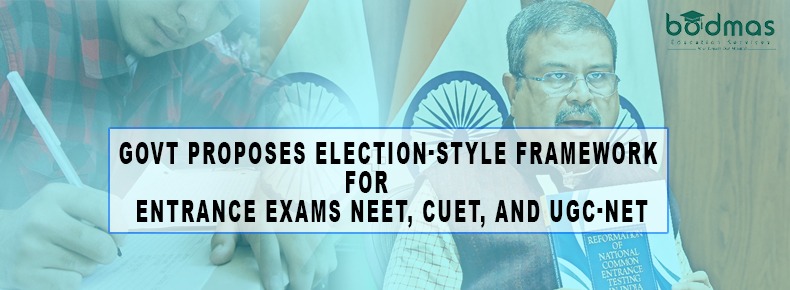Govt Panel Proposes Election-Style Framework for Entrance Exams NEET, CUET, and UGC-NET
Election-Style Entrance Exam: In a significant move to bolster the security and transparency of national entrance examinations, a committee led by former ISRO chief K Radhakrishnan, convened by the Ministry of Education, has proposed a framework inspired by the methodology used in general elections. This approach is aimed at mitigating the operational and security challenges currently plaguing exams like NEET, CUET, and UGC-NET, while enhancing their efficiency and reliability.
Background and Rationale
The seven-member expert panel was constituted in June following widespread criticism of the National Testing Agency (NTA) over security lapses, including the NEET-UG paper leak. In its October report, the committee outlined measures to address these concerns, suggesting a collaborative model that integrates the central and state governments in the examination process, mirroring the electoral system’s dependence on district and state-level administrative machinery.
Key highlights of the proposal include appointing presiding officers at testing centers, stringent sealing and surveillance protocols, and state and district-level administrative involvement in exam logistics.
Proposed Election-Style Framework: How Will It Work?
Appointment of Presiding Officers
- Each testing center will have a presiding officer from the NTA.
- The officer will act as the central authority at the center, much like polling booth supervisors during elections, ensuring adherence to protocols and accountability.
Sealing and Security Measures
- Testing centers will be sealed before the examination day in the presence of district administration and local police representatives.
- The centers will remain under 24/7 surveillance until unsealed on exam day by NTA officials and local administrators.
- Question papers and critical exam materials will be secured in a manner similar to the handling of electronic voting machines (EVMs), stored under police protection until needed.
Administrative Framework
State-Level Involvement
- A state nodal officer, nominated by the chief secretary, will coordinate efforts between the state police, Intelligence Bureau (IB), National Informatics Centre (NIC), and the NTA.
- State-level committees will design strategies for region-specific security concerns and logistical challenges.
District-Level Roles
- The district magistrate will lead the local administration, supported by:
- District police chiefs
- IB officers
- NIC and NTA representatives
- These committees will evaluate testing centers, scrutinizing their history, infrastructure, and risk factors.
- They will oversee the secure transport of question papers using police or paramilitary escorts and GPS tracking systems.
| Level | Key Responsibilities |
| State-Level | Coordinate overarching strategies, ensure regional security, and manage logistical setups. |
| District-Level | Inspect examination centers, oversee secure transportation, and ensure high-security sealing procedures. |
Role of Presiding Officers
- Responsible for sealing and opening centers in the presence of district officials.
- Oversee the collection of answer sheets, escorted under security to central processing locations.
Technological and Security Enhancements
DigiYatra-Inspired Authentication
- Incorporation of biometric verification and Aadhaar-based multi-stage authentication.
- Candidate identity validation during application and on exam day using this “digit-exam” model.
CCTV and Real-Time Monitoring
- Continuous CCTV surveillance at exam centers.
- District monitoring centers to provide real-time oversight.
- Centralized dashboard for live national-level monitoring, ensuring swift issue resolution.
| Technology | Purpose |
| Biometric Verification | Ensures accurate candidate identification. |
| CCTV Surveillance | Provides continuous monitoring at exam centers. |
| Centralized Dashboard | Enhances responsiveness and oversight during exams. |
Restricting NTA’s Role
To mitigate operational overextension and controversies such as paper leaks, the NTA’s responsibilities will be limited to conducting entrance exams. Recruitment tests, which often face logistical and security challenges, will now be managed by other central and state agencies. Furthermore, 10 specialized verticals within the NTA will focus on key areas such as IT security, data management, and operational oversight, ensuring a streamlined and accountable examination process.






















